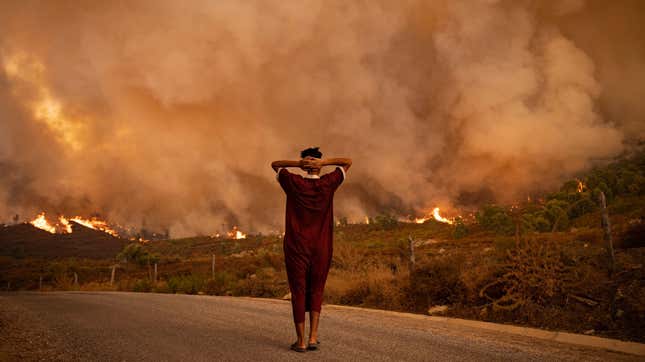
A new Nature survey shows a majority of the world’s leading climate scientists expect “catastrophic” impacts in their lifetimes driven by rising greenhouse gas emissions. Brilliant researchers, they’re just like you and me—but with more data, which actually makes the new survey even more unnerving.
The feature from Nature, published on Monday, involved querying Intergovernmental Panel on Climate Change researchers. These are the same folks who put out a major report earlier this year warning that this is essentially the most consequential decade in human history, one that will play a major role in deciding just how severe global warming will be for generations to come. In other words, they’re deep in it.
Nature heard back from 92 of the 233 living IPCC authors. The results show that six in 10 of the respondents expect the planet to warm at least 5.4 degrees Fahrenheit (3 degrees Celsius), a level that’s well beyond the Paris Agreement target of 2 degrees Celsius (3.6 degrees Fahrenheit). And it’s double the 1.5-degree-Celsius (2.7-degree-Fahrenheit) target that policymakers and researchers (including the IPCC) have identified as a relatively safe level of heating that would allow small islands to remain above sea level and protect millions from food insecurity and violence. Just 20% of the researchers, meanwhile, expect the world to meet the Paris Agreement 2-degree-Celsius target, and a paltry 4% think 1.5 degrees Celsius is in play.
Even more upsetting, 88% of the researchers expect climate change to unleash catastrophic impacts in their lifetimes. Of course, you could argue that’s already happening. Research has shown climate change is playing a role in making heat waves, wildfires, and cyclones worse. To take one example, the Pacific Northwest heat wave this summer that was dubbed a “mass casualty event” was made 150 times more likely due to burning fossil fuels. It went from being a 1-in-150,000-year event in the pre-industrial era to a 1-in-1,000 year event in our current climate. And with each passing year of rising emissions, the odds of more extreme heat like it will rise.
The survey also shows that many scientists are struggling with grief and anxiety. Paola Arias, a climate scientist at Colombia’s University of Antioquia, told Nature that the climate crisis made her decide not to have children. Now, I should note that the Nature analysis is not a peer-reviewed study, and the response rate means there could be 141 happy-go-lucky scientists out there who are so sure the world will tackle climate change that they didn’t bother responding. But the results that mirror a preprint study of kids published in September, as well as anecdotal findings from those who have lived through climate disasters. Basically, those closest to the issue are feeling the most acute anguish.
This pessimism that the world will address climate change adds a new wrinkle to the discussion around just how we’re supposed to “feel” about the current state of the world. The topline findings in the Nature piece definitely lean toward the more doomer end of the spectrum, putting forward the idea that world leaders are simply incapable of getting their act together. Mouhamadou Bamba Sylla, an IPCC scientist from Senegal who is based at the African Institute for Mathematical Sciences in Rwanda, told Nature his home country has put together a bunch of plans to deal with climate change but that not much is being done to implement them.
The feature published as United Nations climate talks get underway in Glasgow. It certainly adds another layer of cynicism about just how much the talks will accomplish, particularly with key leaders skipping the event. But the failures scientists are worried about don’t stop them from acting. Two-thirds said they engage in advocacy on their own time, and 81% said they believe other scientists should, too. It reflects something more nuanced than the “we’re all going to die and should accept it” mentality that’s prevalent in the doomer world. Instead, it’s one grounded in the scientific reality that every ton of carbon pollution that doesn’t end up in the atmosphere is one worth fighting for. A world that’s 5.4 degrees Fahrenheit hotter is scary. But fighting for our future, even in the face of overwhelming odds, is better than doing nothing.
Correction, 11/10/21, 6:42 a.m.: This post has been updated to reflect that the study of children’s feelings about climate change is in preprint and has not yet been peer reviewed.